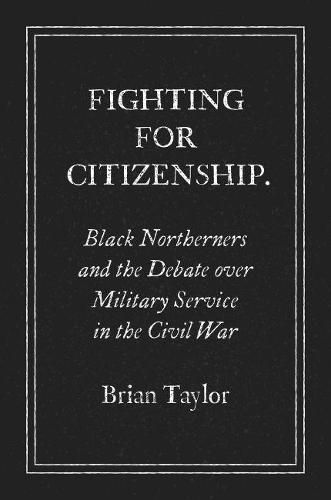Readings Newsletter
Become a Readings Member to make your shopping experience even easier.
Sign in or sign up for free!
You’re not far away from qualifying for FREE standard shipping within Australia
You’ve qualified for FREE standard shipping within Australia
The cart is loading…






In Fighting for Citizenship, Brian M. Taylor complicates existing interpretations of why black men fought in the Civil War. Civil War - era African Americans recognized the urgency of a core political concern: how best to use the opportunity presented by this conflict over slavery to win abolition and secure enduring black rights, goals that had eluded earlier generations of black veterans. Some, like Frederick Douglass, urged immediate enlistment to support the cause of emancipation, hoping that a Northern victory would bring about the end of slavery. But others counseled patience and negotiation, drawing on a historical memory of unfulfilled promises for black military service in previous American wars and encouraging black men to leverage their position to demand abolition and equal citizenship. In doing this, they also began redefining what it meant to be a black man who fights for the United States.
These debates over African Americans’ enlistment expose a formative moment in the development of American citizenship: black Northerners’ key demand was that military service earn full American citizenship, a term that had no precise definition prior to the Fourteenth Amendment. In articulating this demand, Taylor argues, black Northerners participated in the remaking of American citizenship itself - unquestionably one of the war’s most important results.
$9.00 standard shipping within Australia
FREE standard shipping within Australia for orders over $100.00
Express & International shipping calculated at checkout
In Fighting for Citizenship, Brian M. Taylor complicates existing interpretations of why black men fought in the Civil War. Civil War - era African Americans recognized the urgency of a core political concern: how best to use the opportunity presented by this conflict over slavery to win abolition and secure enduring black rights, goals that had eluded earlier generations of black veterans. Some, like Frederick Douglass, urged immediate enlistment to support the cause of emancipation, hoping that a Northern victory would bring about the end of slavery. But others counseled patience and negotiation, drawing on a historical memory of unfulfilled promises for black military service in previous American wars and encouraging black men to leverage their position to demand abolition and equal citizenship. In doing this, they also began redefining what it meant to be a black man who fights for the United States.
These debates over African Americans’ enlistment expose a formative moment in the development of American citizenship: black Northerners’ key demand was that military service earn full American citizenship, a term that had no precise definition prior to the Fourteenth Amendment. In articulating this demand, Taylor argues, black Northerners participated in the remaking of American citizenship itself - unquestionably one of the war’s most important results.